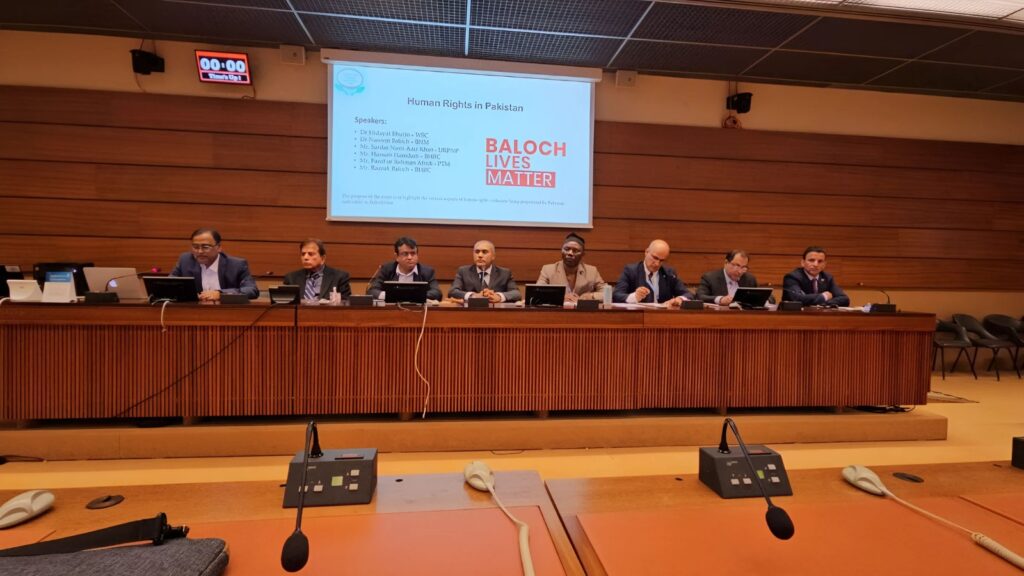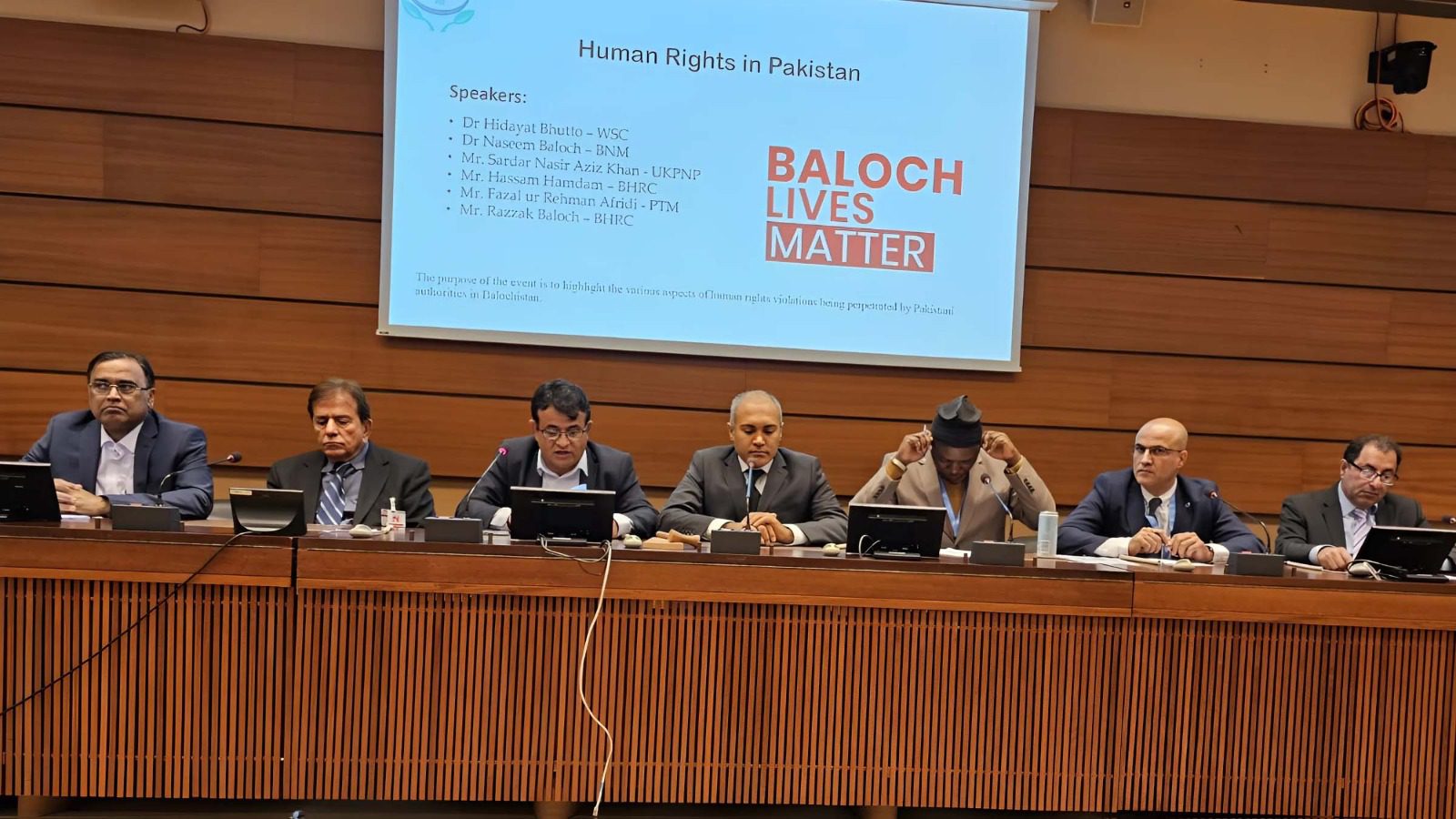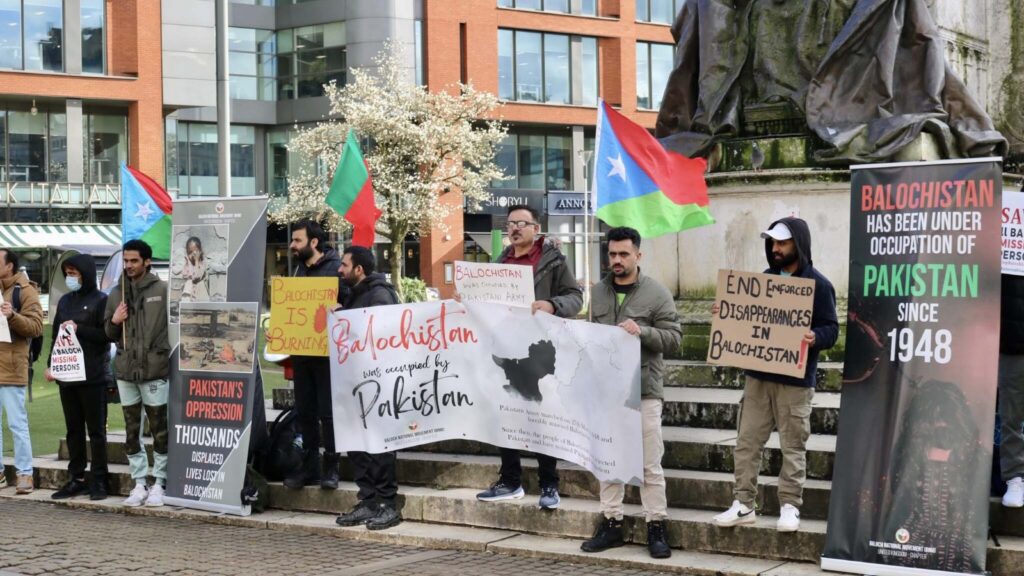At the UN building, BNM Chairman Dr. Naseem Baloch participated in the Baloch Human Rights Council’s side event titled ‘Human Rights Violation in Pakistan: Balochistan in Focus’.
Speaking at the event Dr. Baloch highlighted the distressing situation in Balochistan, attributing it to the Pakistani state’s response to the legitimate resistance against its occupation. He asserted, “Sadly, in response to our legitimate resistance against Pakistan’s occupation of Balochistan, the Pakistani state has resorted to committing human rights violations to suppress our just cause. Therefore, it is important to understand the root causes of human rights violations in Balochistan.”
Reflecting on the historical context, Dr. Baloch recalled the invasion of Balochistan by the Pakistan army 76 years ago. He stated, “76 years ago, on this very same day, the Pakistan army invaded Balochistan with utmost military power and forcibly occupied the Baloch land. March 27th observed as a black day for the last 76 years. This date marks a turning point in Balochistan’s history. It reminds us not only of a dark chapter but also reignites the flames of our struggle for freedom. It was on this day in 1948 that Pakistan, disregarding international law, forcibly occupied the Free Balochistan, crushing our dream of independence.”
Continuing his address, Dr. Baloch delved into the historical background of Balochistan’s independence and subsequent occupation by Pakistan. He remarked, “Let us never forget the historical record. On August 11th, 1947, following the British withdrawal from the subcontinent, Balochistan declared its independence. Historical treaties bound Balochistan to Britain, which recognized Balochistan’s independence based on these agreements. The newly independent Balochistan established a parliamentary system. When Pakistan offered accession, both the Upper and Lower Houses of the Baloch parliament unanimously rejected it. However, Pakistan disregarded the will of the Baloch nation and its sovereign state, occupying Balochistan. In recent years, Britain has acknowledged a role in Pakistan’s occupation of Balochistan. This act of aggression deprived Balochistan of its rightful independence.”

Highlighting the enduring suffering and oppression endured by the Baloch nation, Dr. Baloch lamented the continuous campaign of atrocities perpetrated by the Pakistani state. He expressed, “Since that fateful day, Balochistan has faced a continuous campaign of oppression by the Pakistani state. These atrocities take a devastating toll: loved ones vanish without a trace, leaving families shattered; communities mourn the loss of lives taken without due process, and our valuable resources are exploited to fuel Pakistan’s economy, leaving our people trapped in poverty. Moreover, the Pakistani state systematically seeks to erase our language, culture, and identity.”” These are not just words; they are the deep wounds carved into our hearts, passed down through generations of Baloch nation. The ongoing suffering and oppression in Balochistan are direct results of Pakistan’s unjust rule and occupation. Yet, despite this, the Baloch nation has bravely stood up against this oppression. Our resistance movement, rooted in principles of secularism, gender equality, and universal human rights, stands as a remarkable and inspiring addition to the global fight for freedom.”
Drawing attention to the global implications of the situation in Balochistan, Dr. Baloch emphasized the need for international awareness and support. He stated, “Despite facing oppression, the Baloch people are already making significant contributions to the global struggle for human rights through our steadfast resistance. Just think about the positive influence an independent Balochistan could bring. Our strategic location, deep-rooted history, and dedication to secular values position us to be a valuable partner in the international community. A liberated Balochistan could promote regional stability, drive sustainable development, and pave the way for a future filled with peace and unity.”
Dr. Baloch also raised concerns about the presence of camps belonging to the international terrorist organization ISIS (Daesh) in Balochistan, with direct involvement and support from the Pakistani Army. He questioned, “The camps of the international terrorist organisation ISIS in Balochistan are active, and they operate with the direct supervision and support of the Pakistani Army. This military force is deeply involved with extremist religious beliefs and is blatantly disregarding human rights in Balochistan. It’s crucial to ask: does the world realise that this is the same Pakistani army responsible for the rape of 200,000 women in Bangladesh and the killing of three million Bengalis? The atrocities we witness in Balochistan today reflect the terrible actions of this army in Bangladesh.”
Concluding his speech, He said I hope you will join me in supporting and standing in solidarity with the Baloch national struggle. Together, we can strive towards a future where every Baloch can experience peace and dignity in their lives.



